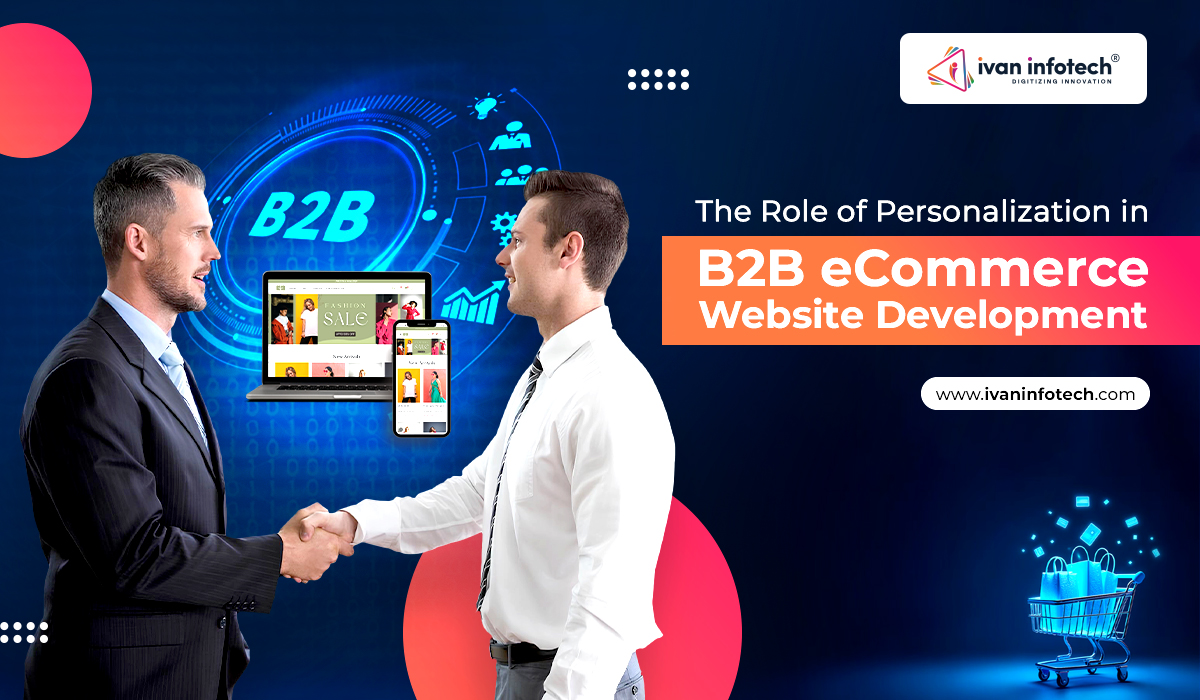
The Role of Personalization in B2B eCommerce Website Development
With the advancement of technology, B2B eCommerce is continuously undergoing an evolution in today’s digital world. Personalisation can be considered one of the core strategies for companies that provide the best eCommerce website development services and are looking to develop loyalty among their clients to enhance the user experience. The complexity of buying processes is one of the major differences between B2B and B2C eCommerce website development, with much longer sales cycles and varied kinds of stakeholders. Personalization is, therefore, one of the most critical aspects of customizing experiences to particular business clients’ needs. As a matter of fact, this blog is here to provide you with more opportunities to learn about personalization as one of the essential parts of a B2B e-commerce website for small businesses in the context of its benefits, strategies, and best practices. So keep reading –
Personalization: Know the Concept
In B2B eCommerce, personalization is what usually means making a memorable experience for a user according to his or her preferences, behaviour, and past interactions with a brand. It requires much more dynamic and niche-related considerations like recommendations, content, price, and communication to build trust and a lifelong bond with a customer.
Value of Personalization
- User Experience
The B2B buying process is pretty complex due to multifaceted stakeholders and diverse needs. Personalization makes this buying process as simple as possible, thus making it feasible to seek the products or other relevant information.
- Conversion Rates
Personalized experiences have more engagement with them. The business expands its scope by a large percentage for conversion when it displays relevant products or content of need for the users.
- Relationship with Clients Enhanced
Trust and loyalty are generated through personalization. Because the business convinces that it understands the needs and preferences of a client, the bonding is enhanced since they return to do business with the company once more and refer others to avail of its eCommerce website development services.
- Competitive Advantage
In competitive terms, rather than a differentiator of brands in saturated markets, it is the competitive advantage of one company over the competitor. A company using personalization can acquire and retain clients more than any other business against its competitor.
Various Elements Of Personalisation
- User Segmentation
Segmentation of users based on certain criteria like the industry type in which a business operates, size of the company, buying habits, and geographic location will enable businesses to offer appropriate content and product offerings to the users. Such segmentation will ensure that users find information in accordance with the needs of a particular group and develop better e-commerce websites.
- Dynamically Content
Dynamic content on the B2B website permits the use of live personalization based on behaviour to be used for the restoration of viewed products recently, personalized recommendations, and targeted messaging to make the user engaged.
- Personalization at the Communication Level
Personalization extends to communication strategies too. Companies may use customized email marketing, targeted ads, and follow-ups with clients to make their interactions more pleasing and engaging.
Implementation Strategies for Personalization
- Data Analytics
Data analytics are valuable for understanding user behaviour and choice. By gathering and analyzing data from sources such as website interactions, previous purchases, among others related feedback, businesses can realize what their clients want.
- AI and Machine Learning
AI and machine learning are the other advanced technologies being used for personalization. These technologies are based on the estimation of the behaviour and preferences of a user. Therefore, advanced machinery will be used to provide automatically appropriate content and recommendations to users.
- User friendly website
A good personalized B2B e-commerce website should provide a smooth experience to the users. Meaning, that it is simple and easy to navigate around with clear calls-to-action and comfortable design. In this way, people visiting your site will be able to find what they are looking for without wasting much time.
- Hear Clients’ Voices
Frequent retrieval of data from clients including their demands and preferences. Surveys, feedback forms, and direct contact help enterprises know how to tailor their offers as best as possible.
Best Practice of Personalization in B2B eCommerce
- Data Privacy
Data privacy regulations are gathering importance, and hence, organizations would be required to ensure proper treatment of vital data. The policies on privacy must remain transparent so that personal information is clarified and also through a client’s consent regarding its usage.
- Relationship Over Time
B2B is typically a game where repeat transactions instead of a one-time deal are mostly involved. Here, personalization needs to be such that improvement over time is maintained against the shifting needs of the client in order to stay ahead of the curve.
- Leverage Omnichannel Strategies
Clients connect to a business on a huge number of multichannel interfaces- the website, social media, emails, and what have you. It hence makes perfect sense for a personalization strategy to ensure an integrated experience across all these channels.
- Monitor and Tune
Personalization does not happen once and forget; it is constantly being monitored and tuned towards performance metrics and feedback from clients. Probably one of the easiest ways to stay relevant and evolve.
- Train Employees on Personalization Tools
Another important area of success is the effective training of employees about using the personalization tools. This would enable the staff to use the data and technology with the help of which personalizations can be made.
Tough Things Faced During the Personalization of B2B eCommerce
There are quite a number of challenges involved with the personalization of a B2B e-commerce website, which businesses have to overcome successfully.
- Buyer Journey
B2B journeys are much longer and more complex, involving often more decision-makers than B2C sales and can’t offer the same personal experience.
- Data Management
There is a vast amount of vital data to collect and manage. Businesses must have very good data management systems that will deliver results accurately and efficiently.
- Interoperability with Existing Systems
The new technologies that are rolled out need to be interoperable with the existing systems that may already be comprehensive and resource-intensive.
- Balancing Automation with Human Touch
Although personalization is an automation process, however, business establishments need to ensure that a human touch is infused in communication. This is where the long-term relationship gets formed with the clients.
Conclusion
Personalization in B2B eCommerce website development can be achieved by understanding individual business clients and using data-driven strategies to boost satisfaction and increase overall sales. And, of course, as technology keeps on evolving, so does the possibility of personalization, and therefore, more than just a necessity for businesses to keep pace with that to provide better B2B eCommerce website development services.
Subscribe to the Newsletter
Don’t lag behind in the ever-evolving age. Stay updated with all tech news and trends. We will not fill your inbox with spam mails. You will only receive updates about the cream contents.
Want Assistance with Software Development?
Anything you need in terms of software, you can count on us. With knowledge, skills and years of experience, we create tailor-made, integrated development solutions with high-end technologies.























Categories
Ai software solution
API Development Services
app development
Application Maintenance
AR And VR Software Development
AR Software Development
Artificial Intelligence
Asset Tracking
Automated system
Big Data
Block Chain Development
Blockchain Development Solution
Blog
cloud computing solutions
CMS Development Services
Construction Software Solution
CRM
custom web application
Digital Asset Management
Digital Marketing
Digital Services
Ecommerce Industry Solutions
ecommerce solution provider
Education Software Development
education software development Solution
Education Software Solution
ERP Software Development
Event Ticketing Software Solution
Finance Software Solution
Food and beverage software
Graphic Design
Healthcare software solution
hospitality software development solutions
hotel software solution
IMS
IOT
IT application development
IT Consultancy
IT services
IT solutions
Java
Java App Development
Lead Generation Services
Legal Software Development
mobile app design
opensource software development
pos software development Solution
Quality Assurance
Real estate software
Restaurant Software Solution
Retail IT Solutions
Retail Management Software
software development
Software Security
Software Testing
Sports Software Development
Supply Chain Software Solution
Transportation Software Development
Travel & Hospitality
UI and UX design
Uncategorized
Web Design
Web development service
Web Programming